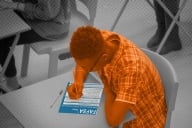You have /5 articles left.
Sign up for a free account or log in.
 Eva Lantsoght is a PhD Candidate in Structural Engineering at Delft University of Technology and blogs about academia and concrete research on PhD Talk. You can follow her on twitter at @evalantsoght.
Eva Lantsoght is a PhD Candidate in Structural Engineering at Delft University of Technology and blogs about academia and concrete research on PhD Talk. You can follow her on twitter at @evalantsoght.
You've selected an interesting conference in your field. Your abstract, and then your paper have been accepted. You have prepared your presentation, and you're ready to go.
All you need to do is pack your bags and head to the airport, right?
Conferences are incredibly busy events, and traveling to conferences can be stressful when flights get canceled, or when you need to navigate a foreign place.
Having the right gear with you, and investing in the necessary goodies, can be a lifesaver. Here are the five most important elements of conference travel gear.
1. Carry-on or suitcase
Buy a good carry-on and (if possible) suitcase. And with “good”, I mean something that has about 5 years of warranty coming with the purchase. With “good”, I mean something that is almost too expensive for a graduate student.
Investing in good bags is one of the wisest decisions you can take when preparing for a conference.
I learned this lesson the hard way. The carry-on in the photograph is my third since I started my PhD. My first carry-on lasted about 1 and a half years. As I walked out of the Las Vegas airport to look for a cab, the handle broke off and I had to use the handle at the side and drag my 40lb carry-on with one arm. I ended up leaving the broken carry-on in my hotel room. Then I bought the cheapest carry-on I could find at Target, and it broke down before I even reached the train station to go to the airport. After all this misfortune, my parents gave me my awesome carry-on for my birthday. It's the best thing since sliced bread.
2. Noise and light canceling
Make sure you bring the right tools to block light and noise. You might need these during the flight to catch some sleep, or, if you're unlucky, in your hotel room.
For noise canceling, you can carry earplugs. If you fly a lot, noise canceling headphones are not a luxury but a good investment.
For light canceling, you can use a sleeping mask. The typical inflight mask won't help much. Buy a good sleeping mask before your trip: one that blocks out all light and has soft patches underneath the eyes to reduce the pressure on your nose and cheekbones.
3. Electronics
Bring your necessary electronics and all adapters. Before you leave, check the voltage and plugs used at your country of destination, and verify if these are compatible with the electronics you are bringing along.
If possible, get different power cords for your laptop, as the typical connector for inbetween your power cord and the foreign plug does not have a grounding. This could have possible devastating consequences for your device.
4. Low-tech tools
Wherever you go and whatever electronics you count on, make sure you carry some pencils, a notepad and a notebook.
Needless to say, but bring a hard-copy back-up of your conference, hotel and ground transportation reservations, and contact telephone numbers.
Bring a stack of your business cards. Even though you can easily link up to people on LinkedIn, giving a business card is still part of the game.
5. Medication
Nobody wants to get sick during a conference, but traveling and long busy conference days might put you at risk.
Always carry a little emergency medication kit. If you travel across timezones, take some sleeping pills to suppress the jetlag. If you travel abroad, take diarrhea medication – you might eat something your body is not used to. You might also like to take cough/cold pills, something for mild fever and something for headaches. It's always easier to have these cures with you than try to find them in a pharmacy in a foreign country.
Bandages are another necessity. The average graduate student only takes out his/her fancy shoes for a conference, and that might result in blisters and chafing.
If you wear contacts, always bring glasses as a back-up in case your eyes get infected during your trip. The atmosphere in airplanes is very dry, so use your glasses to travel as well.
Pro-tip: Become an airline VIP
If possible, try to save airmiles on your airline of choice. You might accrue a lot of miles in your final PhD years, and your loyalty to an airline might pay off.
In the 3rd year of my PhD, I traveled enough miles to reach a status that ensures priority security, boarding and handling of my luggage. These options might sound too luxurious for a graduate student, but they make traveling a little lighter.
What is your favorite conference travel gear? Did you invest right away in the right tools, or did you learn it the hard way? Share your feedback by clicking here.








